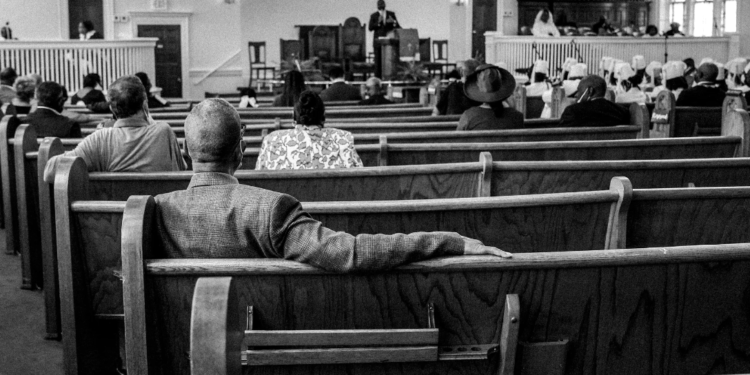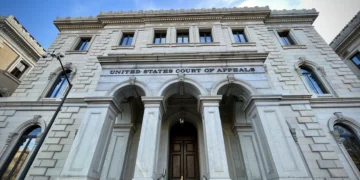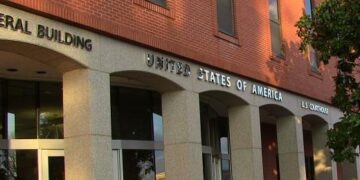June 20, 2024 Story by: Editor
Purple and red light from the stained-glass windows illuminated the faces of those gathered at New Grace Missionary Baptist Church as Highland Park Mayor Glenda McDonald took the pulpit on a recent Sunday afternoon.
For weeks, Rev. Leon Morehead had urged his congregation to attend the “Lift Every Voice and Vote” event, where Democratic organizers were offering on-site voter registration. However, only about 30 people attended, leaving Mayor McDonald visibly disappointed.
“This place should be full,” the mayor said. “Your vote is your way of saying, ‘I’m here, and I will not be moved.’”
Since the Voting Rights Act of 1965, Black voters have been a loyal base for the Democratic Party, with Black churches frequently acting as a political force, providing platforms for candidates and organizing registration efforts.
Civil rights leaders like Rev. Martin Luther King Jr. and Rep. John Lewis began their work within churches, promoting love and peace as avenues for social progress. According to Eric McDaniel, co-director of the University of Texas at Austin’s Politics of Race and Ethnicity Lab, the church has historically been “where Black politics took shape.”
Yet, the connection between the Democratic Party and Black voters has become more fragile. President Joe Biden’s support among Black voters has dropped by double digits from the 92% he secured four years ago. A May poll by The New York Times and Siena showed that less than half of registered Black voters in battleground states plan to vote for Biden in the upcoming election. While no one believes Biden will lose the Black vote entirely, turnout in key cities like Detroit could be a deciding factor.
Former President Donald Trump is making efforts to appeal to Black voters, including campaign stops and considering South Carolina Sen. Tim Scott as a potential vice-presidential candidate. His campaign has also focused on issues like inflation and immigration, which are concerns for many Black voters. Another factor favoring Republicans is the decline of Black church attendance.
Overall church membership in the U.S. has sharply declined since the pandemic, with Black churches seeing some of the largest losses. This trend could hurt the Biden campaign, which might not be able to rely on the Black church for voter turnout as heavily as it once did.
The 30 people who attended New Grace’s voter event were informed about their legal voting rights and Michigan’s new voting access laws, which include nine days of early voting. However, some fear that turnout may be lower, as many voters may no longer attend church in person.
“At this point, not only is the church dying,” said Mr. Morehead, “but voter equality is going to die.”
Declining Church Attendance
Historically, many Black Americans have turned to their church for both spiritual and practical needs. For example, during Mr. Morehead’s service, he shared the stage with an electrician offering to help congregants pursue skilled-trade careers. Black churches have long been political hubs, with churchgoers often hearing sermons on race and politics. Traditionally, this has benefited the Democratic Party.
A 1962 initiative called the Voter Education Project, supported by President John F. Kennedy’s administration, coordinated with Black churches on voter registration. In Detroit, political groups like the Fannie Lou Hamer PAC and The Black Slate have long endorsed Democratic candidates, including Coleman Young, the city’s first Black mayor. The “Souls to the Polls” movement, which began in Florida in the 1990s, encouraged Black voters to head to polling stations after Sunday services and has been adopted nationwide.
But church membership has been declining since the early 2000s, with the pandemic accelerating the trend. In a 2023 Pew survey, only 46% of Black Protestants said they attend church at least once a month, a 15% drop from 2019.
New Grace was once considered a megachurch in the 1970s and 1980s, drawing over 1,000 members to multiple services each Sunday. By the early 2000s, that number had dropped by half. When Mr. Morehead took over in 2022, in-person attendance was under 100. While attendance now averages between 125 and 175, many attendees are older, with a large portion belonging to the baby boomer generation.
“Some of our senior members say, ‘It’s not the same way it used to be,’” Mr. Morehead noted. “You open the doors and people flock in – those days are over.”
One factor behind the decline is increased mobility. Congregants once lived near the church, but many Black Americans have moved to suburban or exurban areas, making it harder to attend services regularly.
“We have turned into silos of self instead of communities of care,” said Rev. Torion Bridges, founder of The Commonwealth of Faith in suburban Redford, Michigan. “The last community institution we’re losing is the church.”
Churches Still Crucial for Campaigns
Despite the drop in attendance, political campaigns still target Black churches. This year, Mr. Biden has spoken at several historic Black churches in South Carolina. Earlier this month, Mr. Trump addressed a Detroit church, calling Biden “the worst president for Black people.”
A June poll by USA Today/Suffolk found Mr. Biden winning just over half of Black voters in Michigan and Pennsylvania, while Trump secured 15% and 10%, respectively. Many political experts believe Biden’s numbers will improve as the election nears, but Democrats are mindful of 2016, when Hillary Clinton lost Michigan by less than 11,000 votes, in part due to lower Black voter turnout.
“The African American vote in Michigan is the cornerstone to Democratic success,” said Heaster Wheeler, senior adviser to Michigan’s Democratic secretary of state.
While Trump’s support among Black voters may be overstated, some polls showing this shift come with high margins of error. And his conviction in the New York hush money case could have already turned some Trump supporters back to Biden, particularly among Black voters who expressed disbelief at the leniency Trump has received compared to most felons.
Younger Black Voters Shifting
As fewer Black Americans attend church, older political strategies like encouraging congregants to vote Democrat may become less effective. According to a Pew survey, younger Black Americans are less likely to attend church and are less loyal to the Democratic Party. While older white voters lean Republican, younger Black voters are more likely to support Trump, with 29% of Black voters under 50 favoring him, compared to just 9% of those over 50.
Many young Black voters find community in LGBTQ+ groups or movements like Black Lives Matter, which has no ties to churches, unlike previous civil rights organizations.
Live-streaming services during the pandemic helped some pastors, like Rev. Charles Williams II of Detroit’s Historic King Solomon Church, maintain connections with younger congregants. But Williams acknowledges that virtual engagement can’t replace the in-person experience.
“It’s the personal connection that is lost, and that’s critical,” said Mr. McDaniel at UT Austin. “It’s the people who are there sitting in the pews who will be more committed.” Source: CS Monitor

















